- Home
- Juliet Marillier
Flame of Sevenwaters Page 6
Flame of Sevenwaters Read online
Page 6
Even in the uncertain light of early morning, it was plain that the annex was gone. In its place was a garden, not a practical herb or vegetable patch but a flower garden with a low wall around it, and in the middle a graceful young tree, perhaps a plum. Beneath were bushes of lavender and rosemary, and at their feet I thought I could discern the heart-shaped leaves of violets. In this spot the fire had raged. In this spot, or very close by, an elderly druid had perished in the flames and a younger one had sustained injuries that could not be healed. In this place my beloved Bounder had been trapped, and had howled for me, and had died waiting for me to come.
I sank down on the wall. I could no more stem my tears than hold back a raging river. “I tried,” I whispered through the hot tide of my grief. “Bounder, I tried my best.”
I stayed there, remembering, as the day crept closer. The fact that I had failed Bounder hurt far more than what had happened to me that night. I had loved my dog more dearly than anyone in my family could understand. How could I have let him die, alone, frightened and in pain? I bowed my head and closed my eyes. I was not sure I believed in any god, but I sent up a prayer to whatever deity might have a special interest in creatures. I prayed that Bounder’s spirit had been set free quickly; that he had not suffered much. I prayed that somehow I could make good my failure to save him.
“Maeve?” The deep voice was my father’s; he had come up so quietly I had not realized he was there. Now he sat down beside me and took my misshapen hand in his. Well, he could see the tears on my cheeks; he, of them all, would be the one who understood. He had his two wolfhounds with him, long-legged gray shadows. They gave me a glance, then settled quietly at his feet.
“Whoever planted this garden knew all the plants I loved,” I said. “Someone even remembered my fondness for plum preserve.”
Father nodded. “The violets were your mother’s suggestion; she recalled a favorite gown you wore until it was almost in shreds, dyed in exactly that shade. Muirrin said rosemary denotes a strong woman. Clodagh remembered that you loved the scent of lavender. There’s a dog rose in the corner there—it may not surprise you that Eilis wanted those. Deirdre thought of the plum tree, and Sibeal worked out the most favorable alignment and shape for the garden, using an arcane druidic formula. Over the years since you went away all of us have spent time here, thinking about you. I wish more of your sisters were here to welcome you home. Even Deirdre is only with us a few days; she and Illann must head back soon with the children. But she’s not far away.”
“I like the little garden,” I said. A dog rose; dear Eilis. That made me want to laugh and cry at the same time.
“It was something I had to do, or I’d have found it difficult to walk across my own stable yard. I often come here in the early mornings. What happened…” Father hesitated, his head bowed. “It’s still raw, even after so long. Perhaps, now that you are home again, that pain may start to fade a little. My dear, it’s so good to see you. My lovely daughter.”
“And you, Father.” The tears were abating; I wiped my face awkwardly on my sleeve. “I know I have come at a difficult time. Uncle Bran showed me the letter you sent, and he told me about the terrible things that have been happening here. I suppose it’s obvious why we’ve brought the yearling, Swift. The best horse in all Erin could not make up for the loss of a man’s sons, but such a gift may smooth your path with this chieftain a little.” How could I tell him I was not home for good? His eyes told me he had spent ten years longing for this moment to come. “I have a certain knack with horses, even nervous or difficult ones,” I said. “That’s why I’ve come now, even though it might not seem the best time. Swift needed me on the journey. The grooms, Emrys and Donal, are both very capable. But there are things I can do that they can’t.”
Father did not answer for a while, and I wondered if he had understood the unspoken part of my explanation. “The yearling is remarkable,” he said eventually. “It’s a pity Eilis is not here to see him, since she’s always had such a passion for horses.” His smile was wistful, as if he would like nothing better than to go back to the way things were, his daughters innocent children, his domain peaceful, his neighbors allies. “I did know about your gift with animals. Liadan occasionally gives me news through our special link. Without that, I could not have endured your staying away so long.”
I said nothing to this. When pairs of twins were born in the Sevenwaters family, they often had the ability to link their minds and exchange their thoughts, even when they were far apart. My sisters Clodagh and Deirdre could do it, as Father and Aunt Liadan could. It was a gift that could be both useful and inconvenient, and I had never been sure how often they used it or how much they told each other.
“Bran and Liadan believe your ability is quite exceptional,” Father went on. “I’m grateful to you for helping bring Swift here safely. I’ve had a word with your fellow, Emrys, and with my stable master, Duald—you may remember him. The creature is fine looking, but he’s highly strung, perhaps a danger to himself. That makes me think twice about his suitability as a stud horse, and I imagine Cruinn of Tirconnell would agree.”
“Swift is still young, Father. Bran’s decision surprised both me and the stable master at Harrowfield. Had it not been for—” No, I could not say I had come home only because of the risk to Swift of traveling without me. “I’ve worked with Swift for a long time and I know him well. He needs a quiet period at pasture, followed by a little more work in the yard. Then he’ll be ready to go on to Tirconnell.” Seeing a certain doubt on my father’s face, I added, “Swift’s temperament is sound, despite appearances. Otherwise he wouldn’t have weathered the sea voyage as well as he did. If there’s a safe, quiet field where he can graze and a place where we can do some careful work with him, he should be ready to travel before the weather gets too cold.”
Father smiled; the somber look lifted. “You speak like a seasoned stable master, Maeve.”
“I can’t ride,” I said flatly. “I can sit behind someone and hold on, but that’s about it. I can’t put a bridle or a saddle on a horse. I can’t lead a creature around the yard or unfasten a stable door or brush out a mane or perform any of the hundred tasks a groom does every day. But people find me useful, all the same. Animals seem to trust me. Even the most difficult ones. I can help with Swift. I don’t need hands to do that.” After a moment I added, “I hope Mother won’t think that’s inappropriate. She must see that I will be no help to her with domestic matters.”
Father sighed. “I doubt if your mother has thought beyond her joy at having you back home,” he said. “If you have concerns, best be open about them. I’m sure she will understand.”
I did not share his confidence. In the time of my childhood, domestic matters had been of utmost importance to Mother. Every serving man and woman at Sevenwaters had known what rigorous standards she set. Every one of them had felt her scrutiny; all had no doubt witnessed her displeasure when someone fell short of those standards. She’d been well liked, for all that; she’d respected and praised good work, and treated people fairly. But she’d never had a tolerance for idleness, and I wondered where a daughter who could not work—at least, not at what Mother would think appropriate tasks—might fit into her ordered world. I found myself dreading our first real meeting.
“I talked to Finbar last night,” I said, changing the subject. “His tutor brought him up to visit me.”
“Luachan is a good man.”
I hesitated, not wanting to sound critical. “None of us had a tutor when we were seven years old,” I said. “It’s because he is a boy and a future chieftain, I suppose. Luachan seems…not very druidic.”
“Ciarán recommended him. Luachan is a chieftain’s son. He’s not only well educated; he’s expert in various forms of combat, both armed and unarmed.”
I blinked at him, too surprised to comment.
“He found his spiritual calling a number of years ago and set all that behind him. But the skills remain. These da
ys he practices regularly with my men-at-arms. He was the right choice for Finbar.”
I took a moment to make sense of this. “So he’s a bodyguard as well as a tutor?”
“Regrettably, that is necessary. You’ll know the story of Finbar’s abduction as a very new baby. After Clodagh and Cathal rescued him, Mac Dara left us alone for a few years. We thought he’d ceased meddling. But now…” The smile was gone; I could almost see the weight on his shoulders. “If you know about Cruinn and the need for compensation, you know about the event called the Disappearance, I take it?”
“I do. And I know you believe Mac Dara is behind that. So you think Finbar is at risk again?”
“We can’t know what Mac Dara will do. His acts of violence are becoming more savage and more frequent. It’s as if he is suddenly in a hurry, desperate to get what he wants. Even Conor did not know why that might be. In any event, I felt Finbar needed protection. I was reluctant to saddle him with a hulking bodyguard; the lad is only young. Luachan’s presence gives Finbar more freedom. He can go beyond the walls of the keep. He can ride or walk as far as the nemetons or along the lakeshore and do the things small boys love to do.” Another sigh. “Your brother is a solemn child, as you’ve no doubt noticed. Eilis could draw him out, get him laughing, keep him active and happy. But Eilis had the opportunity for an adventure, and we let her go.”
“Galicia. A long way.”
“A long story, and perhaps not one for me to tell. She went with a cousin of mine. Aisha and her husband will take excellent care of your sister. It will be good for Eilis; she always wanted to spread her wings and fly.”
My throat tightened again; I ordered myself not to shed a single tear. What if my own wings were broken beyond repair? I had long ago banished self-pity, since it did nothing but make folk more miserable.
One of the wolfhounds had her eye on me. “What are the dogs’ names?” I asked. They could not be the same pair I remembered, who had already been old when I was a child.
“The dog is Broccan—son of my old Brocc—and the bitch is Teafa. She’s from Deirdre and Illann’s household.”
“Teafa,” I said softly. “Come here, girl.”
She got up, a leggy, elegant creature, and came over to me. Moving my arm slowly, I stroked her neck with the back of my hand, using my knuckles to rub the sensitive spot behind the ears. After a few moments Teafa sat down and laid her muzzle heavily on my knee.
“There are pups,” Father said. “Three of them, weaned now and ready for training. If you’d like one for your own—”
“No.” My response was so sharp Teafa lifted her head, startled. “I mean, no thank you, Father. I don’t want a dog. Teafa, good girl, rest easy.”
“It’s been ten years,” Father observed after a while.
“A person might think that is enough time for the memories to fade. A person might believe this beautiful garden, planted with such love, might wipe away the guilt of that night. But it doesn’t. I’ll never want another dog.” Teafa was drooling in pleasure as my knuckles worked on her; there was a damp patch on my skirt.
“Guilt,” Father echoed. “It clings like a burr, and nothing can dislodge it.”
It took me a moment to realize he was not talking about me, but about himself. “Father,” I said firmly, “you could not have prevented me from being burned; the fire took hold too quickly. You did save my life. I would never, ever wish I had died that night rather than live with my injuries. There is no reason at all for you to feel guilty.”
“Nor you,” he said. “You tried your best to save your dog. As you said, the fire took hold too quickly. Nobody could have got him out in time. Nobody could have known beforehand what would happen. But our minds do play it over—what if I had made sure there was a guard on the kitchen door so Maeve could not slip outside, what if I had not let Bounder go to the annex for shelter, what if, what if…” He laid a gentle hand on Broccan’s head. “Bounder would have died quickly,” he said. “He would have been overcome by smoke before the flames reached him. If the dog’s spirit lingers to watch over you, Maeve, be certain he forgives any wrong you may believe you did him. That creature was devoted to you.”
I got to my feet. It was light now; the sun had risen beyond the cloak of trees, and in stables and outbuildings folk were getting ready for the day’s work. Rhian would likely have fetched our breakfast by now, and to my surprise I felt hungry.
“Will you eat with us this morning?” Father asked.
“I’ll eat in my chamber. That’s easier for everyone. I suppose Mother and Deirdre will be in the sewing room later—please tell Mother I will come and find them. And I promised Finbar I’d show him Swift.”
We walked back together, arm in arm, with the wolfhounds padding on either side. At the foot of the stairs we parted. “Father,” I said as he was turning away. “You won’t need to protect me. I’ve learned to fight my own battles.”
“You’re my daughter,” he said with a little smile. “A father protects his daughters.”
“Then all I’d ask is that you trust me to make my own decisions,” I said. “Some of my choices may seem unconventional. But I know what I can do and what I can’t. I want to live the best life I can, Father.”
“In that, I will always trust you to make the right choices, Maeve. Now you should go to your breakfast. I have a council later in the morning. The arrival of Swift may now play a part in our plans.”
I wished I could be part of his council. The matters he faced were weighty indeed, with Mac Dara’s acts of savagery increasing and Father’s neighboring chieftains one by one turning against him. At Harrowfield I had learned to contribute to discussion about strategic matters; I was not sure how welcome my contribution would be here.
“I’ll keep you informed,” Father said. “Go on now. You must eat.”
By the time Rhian and I made our way to the sewing room, the morning was well advanced. We walked in to find the place full of women. The shutters were wide-open. Slanting sunlight fell on industrious hands, on heads bent with concentration over spinning or mending or embroidery. My sister Deirdre, straight-backed and immaculately dressed, was working on a tiny, delicately patterned garment. Mother got up from her sewing when she saw me, opening her arms in welcome.
“Maeve! Come in, my dear!”
She embraced me; Deirdre got up to give me a kiss. The others greeted me, then turned their attention back to their work. I guessed Mother had instructed them all on how to behave. There were some familiar faces from childhood: head seamstress Orlagh; Mother’s maidservant Eithne; the wives of one or two long-serving men-at-arms. I bestowed nods and smiles.
“Sit down with us, Maeve, and tell us about your journey.” In company with so many women, Mother was not going to touch on sensitive matters such as what she thought of my staying away for a whole ten years, or how my crippling injuries might affect my future. “You must be tired.”
“I slept well, thank you. I have spoken to Father this morning; I met him in the little garden where…where the annex used to be. Perhaps there’s some handiwork Rhian can help with. She’s an expert seamstress.”
“But we don’t want to take up too much of Rhian’s time. You’ll be needing her…”
“Not all the time,” I said firmly. “And she’s a very capable needlewoman. She mends my things, though I am no longer the child who used to come home from adventures in the forest with her gowns ripped and muddy.” I caught Rhian’s eye and suppressed a smile. My time in the stable yard tended to have something of the same effect; she was kept busy darning my stockings and trying to get the smell of horse out of my gowns.
“Orlagh will find you some mending to do, Rhian,” Mother said. “We always welcome an extra pair of hands.” A moment later she flushed red, realizing what she had said.
I sat down beside her. “It’s all right, Mother,” I said quietly, under cover of Orlagh’s instructions to Rhian about hemming, which I could have told her were superfluous. “I
t’s the way things are. I’m used to it now.”
“Of course. But I wish…” She was clearly mortified; lost for words. Had she changed so much since the time of my childhood? We had always viewed her as the strong center of our lives. Perhaps my memory was playing tricks.
“Maeve is a grown woman, Mother.” Deirdre kept her voice quiet, so the words would reach only Mother and me. “From the little I’ve seen so far, she seems to be coping rather well.”
I was surprised. I did not remember this particular sister standing up for me very much in those early days. Indeed, I recalled her being somewhat absorbed in her own interests. I gave her a smile of acknowledgment. “I gave up wishing long ago,” I said. “There’s no point in it. Now tell me, Deirdre, what’s that you’re making? May I see?”
The conversation turned to family, and I was rapidly brought up-to-date on the progress of my various nieces and nephews and the news of what all my sisters were doing. Sibeal was expecting her first child; the little gown with embroidered owls was for her baby, who would be born far away in Kerry, in the spiritual community where my younger sister now lived and worked. In the north, Muirrin had a little boy and Clodagh twins. Then there were Deirdre’s children, this morning out on a walk with their nursemaids. The Sevenwaters family was becoming a far-flung tribe.
In my turn I told them about Aunt Liadan and Uncle Bran and the cousins in Britain. But all the time I was aware of industrious hands around me, plying shuttle or spindle or needle, and beyond the windows the sun moving across the sky. I reminded myself that Mother had waited ten years for this conversation. I sat beside her, calm and still, making sure I gave every appearance of enjoying myself. I would not let her know that I was already restless and longing to be out of doors.

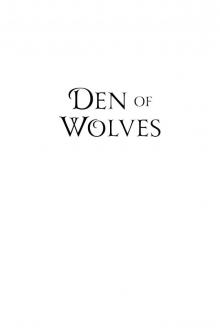 Den of Wolves
Den of Wolves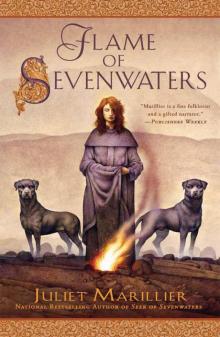 Flame of Sevenwaters
Flame of Sevenwaters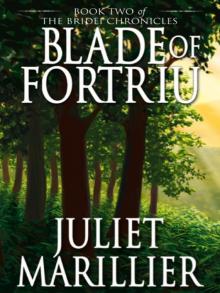 Blade of Fortriu
Blade of Fortriu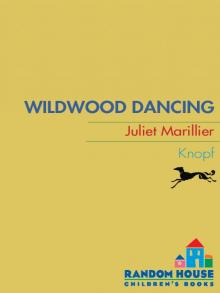 Wildwood Dancing
Wildwood Dancing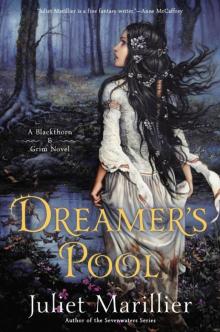 Dreamer's Pool
Dreamer's Pool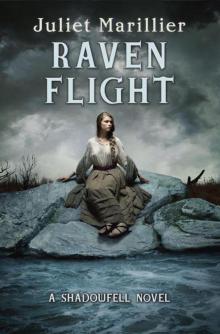 Raven Flight
Raven Flight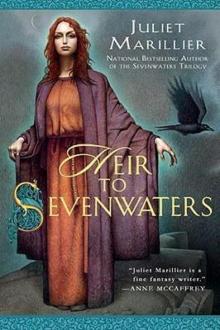 Heir to Sevenwaters
Heir to Sevenwaters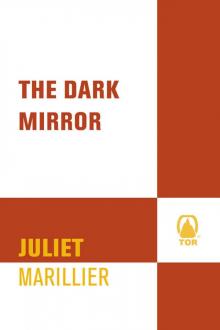 The Dark Mirror
The Dark Mirror Daughter of the Forest
Daughter of the Forest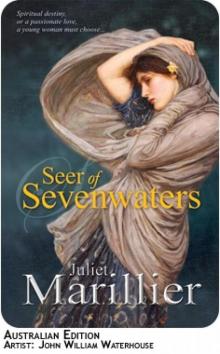 Seer of Sevenwaters
Seer of Sevenwaters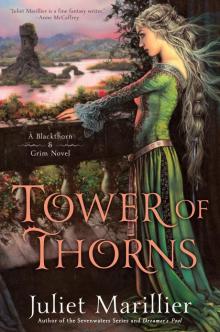 Tower of Thorns
Tower of Thorns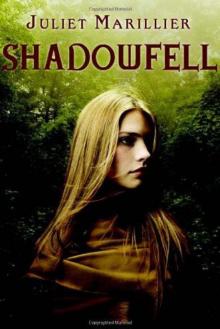 Shadowfell
Shadowfell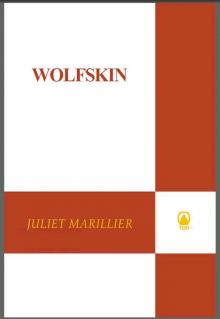 Wolfskin
Wolfskin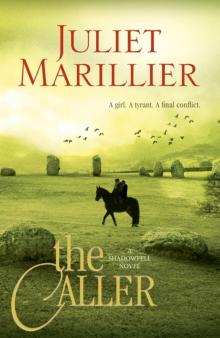 The Caller
The Caller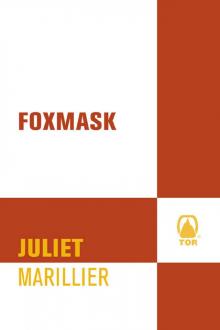 Foxmask
Foxmask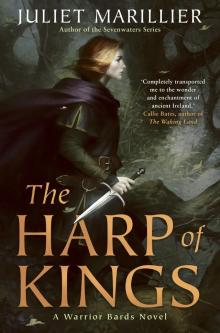 Harp of Kings
Harp of Kings The Well of Shades
The Well of Shades Heart's Blood
Heart's Blood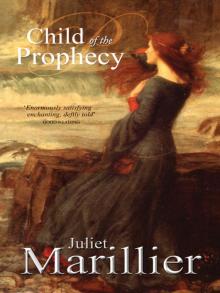 Child of the Prophecy
Child of the Prophecy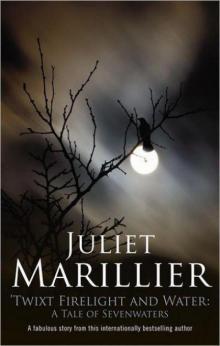 Twixt Firelight and Water
Twixt Firelight and Water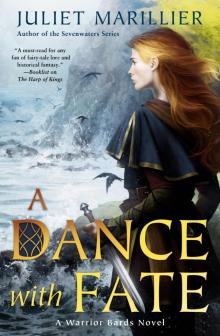 A Dance with Fate
A Dance with Fate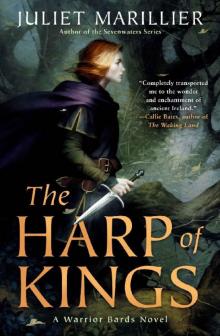 The Harp of Kings (Warrior Bards)
The Harp of Kings (Warrior Bards)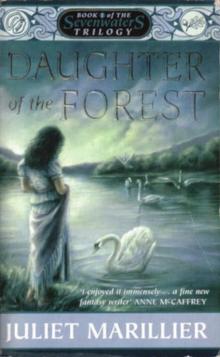 Daughter of the Forest (The Sevenwaters Trilogy)
Daughter of the Forest (The Sevenwaters Trilogy)![Sevenwaters [06] Flame of Sevenwaters Read online](http://i1.bookreadfree.com/i2/04/08/sevenwaters_06_flame_of_sevenwaters_preview.jpg) Sevenwaters [06] Flame of Sevenwaters
Sevenwaters [06] Flame of Sevenwaters![[Sevenwaters 04] Heir to Sevenwaters Read online](http://i1.bookreadfree.com/i2/04/12/sevenwaters_04_heir_to_sevenwaters_preview.jpg) [Sevenwaters 04] Heir to Sevenwaters
[Sevenwaters 04] Heir to Sevenwaters